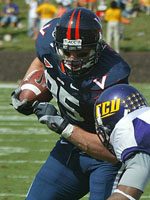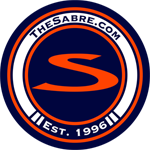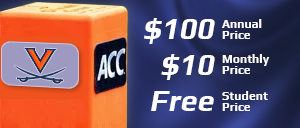Complimentary callers and a look ahead to Georgia Tech next weekend dominated this week’s Cavalier Call-In with Virginia head coach Al Groh.

Koehn asked Groh how much this win could help a young team finding its way through the development process.
Coach Groh pointed out that a team benefits doubly from a win like Saturday. First he said, the team learns lessons from the game itself, but perhaps more importantly, the team learns about itself and how it performs in those circumstances and that is how a team gains confidence for the future.
Koehn then asked Groh about the two-minute drill and having to move the ball 82 yards in less than two minutes.
Groh commented that Marc Verica handled the drive “very, very well.” He said the two-minute drill is something the team practices almost “continuously” from training camp to game day. There are two things that are vital during the play, communication and organization. These are as important as the plays themselves, Groh said, but the players also have to execute and they did that. Key also, he commented, were the “unofficial time outs,” getting the ball out of bounds, and clock management.
Koehn asked Groh what happened to the offense in the final minutes, as it had been off pretty much the rest of the game.
Groh responded that it is something we see in sports quite often as last weekend alone, four NFL games were won with a field goal as time expired. That is why the game is 60 minutes long, he said. “Everybody has equal right to that time.” Groh explained that is why it is so crucial to perform well in the game’s final five minutes.
Next, Koehn asked Groh about the extra point try on the final touchdown that was partially blocked but still went over. He wanted to know what was going through Groh’s head. Groh said that it happened so fast; it was over before he knew it and there wasn’t time to reflect at the moment.
Koehn segued the special teams’ struggle into asking if those struggles played into his decision-making or strategy in overtime.
Groh answered that it did not factor in. They “hoped it didn’t come to that,” Groh said because a field goal would have likely only have meant another overtime period.
Koehn then brought up UNC’s prevent defense on the final drive, which allowed the Cavaliers to score. He asked what Groh’s thoughts on this strategy to keep a team from driving the length of the field.
Groh said that everyone had to keep in mind that the two previous weeks, the Tar Heels had won by keeping their opponent from scoring at the end of the game so it had worked at least twice in the recent past. “Do what your team is good at,” Groh said. If they had done something unfamiliar to their players, he said, they could really have to second-guess themselves.
Bob from Hilton Head, SC started off the call-in portion of the show, complimenting Groh on the last few weeks and calling his work “unbelievable.”
Groh graciously accepted the compliment but said that there was still a lot of work to do over the next five weeks and that the players were aware of that. They had made a special point he said, to stress that it is over and done with and now it is time to move on to the next game.
Kathy from Charlottesville was up next and she congratulated Groh on receiving the game ball from Cedric Peerman . Groh explained that the game ball was something that has been done for a long time. They used to actually give a player the ball until the NCAA mandated that it is considered as an extra benefit so the award became more of an honorary thing that was more sporadic. Regardless, he said, it was “very meaningful,” that the players went out of their way to give him the ball. “That’s one of those trophies that will last a long time,” he said.
Kathy wanted to ask about two players who really exemplified the ‘next man up’ philosophy this weekend: Chase Minnifield and Darren Childs .
Groh commented that it was nice to be able to bring to the public attention, two players who probably don’t get as much attention as others but who definitely deserve it after this week’s performance. Groh explained that prior to the game, it had been heavily discussed that it was vital to UVa’s success to contain UNC receiver Hakeem Nicks. Crucial to this effort, he said would be the match-up between Nicks and Virginia’s Ras-I Dowling. However, once Dowling got hurt, he said, there was this feeling of “Whoa,” on the sidelines. But Vic Hall moved over and assumed Ras-I’s role, he explained, and Chase moved into Vic’s Role. And on the dime, he said, Mike Parker took over Vic’s Role.
“Those three had to do something they don’t normally do in practice,” he said. Groh highlighted the fumble caused by Hall late in the third quarter. “Typical Vic Hall,” he said. Then he mentioned Childs who he said had probably only played a single digit amount of plays before Saturday and then put in 60 in one game. “Marvelous performance on Darren’s part,” Groh said. Responding to people who had asked him why Childs hadn’t played prior to this, Groh respectfully said that there hadn’t necessarily been anything to indicate that this was coming from Childs.
Koehn then asked if there was any update on Dowling or Appleby. Groh said yes but it wouldn’t become public until the league’s approved injury list comes out Thursday.
Leo from Stanardsville was up next. He commented that he had met Groh three weeks ago and he still felt the same way as on that day. He complimented Groh, saying that he is the same coach today that he was after losing to Duke and he knew his players were putting in 100%.
Groh said he appreciated the compliment and noted how they had tried to instill in the players a level of respect for the game and how one must prepare for it. They told them repeatedly, he said, that if they stick together and do things right, a good team would emerge.
 |
|
John Phillips is on pace for apporoximately 50 catches. |
Blair from Clifton Forge had two questions. First, he wanted to know why the Cavaliers weren’t throwing the ball as much to tight end John Phillips .
Groh responded that Phillips had 25 balls so far this season at the halfway point, which projects him at 50 for the season; that would probably lead the conference he said. He explained that in the past, Virginia has relied heavily on its tight ends, which takes some firepower out of the offense. Their ability, this season, to spread the ball out to different receivers has really given the offense some firepower. When you can get that distribution, he said, and spread out the field, it really makes it hard for the defenders.
Next Blair asked why the coaches waited until so late in the fourth quarter to begin throwing the ball downfield.
Groh answered that the ball actually had been downfield several times during the game, citing a go-route, the conversion on 3rd-and-22, and the potential pass interference play that he referred to as a “little difference of opinion.” In his eyes, Groh said, “We’re increasing our ability to get up the field.”
Bill from Churchville opened by saying that he had really enjoyed watching the team develop this season. Groh said that he had certainly enjoyed it thus far and that everybody has a role on the team and everybody has a chance to do something in the rest of the season.
Bill wanted to know about the GT offense and if there had been a lot of offseason research that went into preparing Saturday’s game.
Groh said that such a complex option offense is nearly impossible to prepare for in the two days (Sunday, Monday) before the game plan is presented to the team. Preparing for this offense which is so “out of cycle,” and so unusual to the conference, Groh said, wouldn’t have been possible in two days so there was a lot of research during the summer months including watching tape of coach Paul Johnson’s offense at Navy. The plan has to be finished tonight Groh said and “hopefully we make the right decisions.”
Koehn asked then if the offense they have seen out of GT this year is similar to the one he ran at Navy.
Groh explained that when a coach develops his philosophy and system over 25 or so years, “it wouldn’t make much sense to start from scratch.” However, he said, every team has different strengths and flaws and ultimately a coach can only do what his players can do but Johnson seems to “have found a pretty good formula.”
In the Advanced Auto Parts Scouting Report, Koehn brought up the much-discussed option offense of GT again and asked what is the biggest key to defending it.
Groh responded that he understood why the offense was getting so much attention but really the defense is stronger, citing that they were No.1 or No. 2 in almost every defensive category in the ACC. He said they are good against the run and the pass and don’t give up very many points. Also, he pointed out, having such a stringent defense gives the offense a lot of liberty to do things they couldn’t otherwise do. The combination of a wide-open offense and a defense that gets off the field quickly, dominates time of possession, he said. It really forces you to score efficiently.
Koehn cited the amount of youth on the GT team and asked Groh if he was surprised at their quick start.
Groh said that Johnson had done a “marvelous job” of instilling his systems in such a short period of time and this really shows how well the players are buying into it. That team is “youthful but talented,” Groh said. Now they’ve got a real “shot in the arm,” with a new philosophy.
Elizabeth was the next caller and asked how missed plays are corrected after a game.
Groh explained that the first practice after the team meeting where the players are corrected on video, there is a correction period where they re-run the plays and let the players correct themselves. “We don’t feel the correction has been made,” he said, “until the players can really do it. That’s an integral part of that practice.”
Next Kurt asked about recruiting in the 757 area code (Tidewater) and asked if Groh was in contact with coaches in that area, specifically for any players at Smithfield or Oscar Smith High School.
Groh said he had actually talked to three or four coaches from that area in the last week or so about both players and just to congratulate them on their success. He also said that NCAA regulations prevent them from mentioning any players that may be verbally committed but it is their “expectation” that players from that area would be in their incoming recruiting class.
Koehn wanted to finish this week’s show by talking about the tumultuous ACC. He asked if Groh thought it was fun to be in such a competitive conference or if it was troublesome that he could lose any given weekend.
Groh laughed and said it is more fun to be up 35-3 but it’s about “completion, testing your mettle,” and “keeping your wits.” It’s about being that basketball player who always wants the ball at the end of the game, he said. You have to understand that it won’t always go in every time but you still want to take the shot.
Koehn asked if Groh expected the conference to be so close with so many close games.
Groh responded by saying that unless you have a completely dominant team, referencing USC, Texas, etc., then you have to accept at the beginning of the season that you have to construct your team to function in those close game situations, making the final minutes of a game that much more important.
That’s about it for this weeks’ installment of Cavalier Call-In. The Hoos face Georgia Tech in Atlanta on Saturday.



